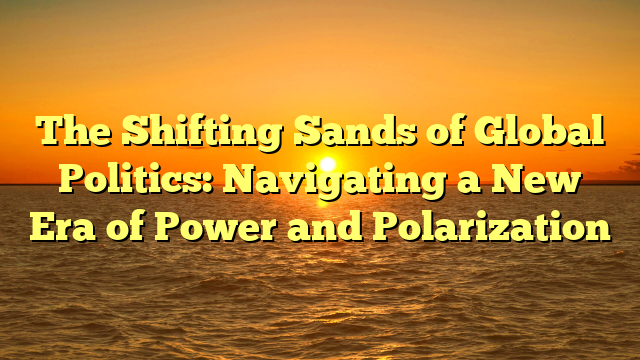In the early 21st century, global politics is undergoing a profound transformation. The traditional balance of power that once shaped international relations is being challenged by a mixture of rising nationalism, shifting alliances, digital influence, and the complex fallout from recent global crises. As nations grapple with internal instability and global interconnectedness, the political landscape is becoming more fragmented — yet paradoxically more intertwined.
The Rise of Multipolarity
For decades after World War II, global politics was largely defined by a bipolar system — the United States and the Soviet Union locked in a Cold War rivalry. Following the Soviet collapse, the U.S. stood as the sole superpower. But today, we are seeing the emergence of a multipolar world. China’s economic and military rise, Russia’s assertiveness, the European Union’s strategic recalibration, and regional powers like India, Brazil, and Turkey are all reshaping the geopolitical chessboard.
This shift has weakened the dominance of traditional Western institutions. The United Nations, NATO, and the World Trade Organization, once pillars of the liberal international order, now face scrutiny and occasional irrelevance as emerging powers seek to build alternative alliances — such as BRICS or the Shanghai Cooperation Organisation — to reflect their interests.
The Populist Surge
One of the most noticeable political trends globally is the rise of populism. Fueled by economic inequality, cultural tensions, and disillusionment with establishment politics, populist leaders have gained ground across the Americas, Europe, and parts of Asia. birtoto like Donald Trump in the U.S., Jair Bolsonaro in Brazil, Viktor Orbán in Hungary, and others have disrupted conventional politics, emphasizing nationalism, skepticism of globalism, and promises to “put their country first.”
While populism can give voice to neglected communities, it also carries risks: democratic backsliding, erosion of press freedom, and weakening of judicial independence. The question many democracies face is how to balance the will of the majority with the protection of minority rights and institutional integrity.
The Digital Dilemma
Technology has become a double-edged sword in politics. On one hand, digital platforms have democratized information, giving people unprecedented access to news and political discourse. On the other hand, social media has enabled misinformation, foreign interference, and political polarization. Algorithms, bots, and echo chambers have contributed to a climate of distrust, where facts are often challenged and consensus is harder to achieve.
Moreover, cyberwarfare and surveillance have become tools of statecraft. Countries are now investing heavily in cybersecurity — not just to defend against hacking, but to shape narratives, influence elections, and control domestic dissent. The digital battlefield is no longer hypothetical; it is an active front in modern politics.
Climate and Conflict
Another defining issue of contemporary politics is the climate crisis. As nations face rising sea levels, extreme weather, and resource scarcity, environmental issues are no longer niche topics. They are central to political debate and policymaking. Climate change has geopolitical consequences — from migration pressures and food insecurity to disputes over water and energy.
Additionally, the politics of climate intersect with economic inequality and global justice. Developing nations argue for their right to grow economically while calling on wealthier nations to shoulder more responsibility for emissions. This tension plays out in every major climate summit, complicating efforts to reach meaningful global agreements.
Conclusion: Navigating the Future
Politics today is defined by complexity, contradiction, and rapid change. While some view this as a time of crisis, others see it as a moment of opportunity — a chance to rethink outdated systems, foster more inclusive democracies, and build a more equitable global order.
Citizens, now more connected and informed than ever, have a crucial role to play. Through civic engagement, advocacy, and informed voting, they can influence the direction of their countries and the world at large. Whether the future brings greater cooperation or deeper division will depend not just on leaders, but on the collective choices societies make in this pivotal era.
